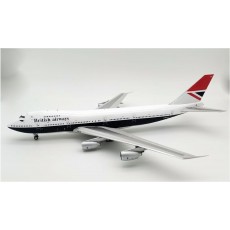
Shipping discount start from 2 models, read the detail here
- Forgot your password?
- Forgot your username?
- Don't have an account yet? Register now!
ARD200 British Airways B747-200 G-BDXH 1:200
ARD200 British Airways B747-200 G-BDXH 1:200
$139.00
| Information | |
|---|---|
| Aircraft | B747 |
| Airline | British Airways |
| Brand | ARD200 |
| Material | Di-Cast |
| Registration Number | G-BDXH |
| Scale | 1:200 |
On 24 June 1982, British Airways Boeing 747-236b G-BDXH, Speedbird 9 from London to Auckland and named City of Edinburgh, flew into a cloud of volcanic ash thrown up by the eruption of Mount Galunggung 112 miles south-east of Jakarta, Indonesia, resulting in the failure of all four of its engines inflight. At approximately 20:42 Jakarta time, the number four RB211 engine made by Rolls Royce began surging and flamed out. The flight crew immediately performed an engine shutdown drill, which involved quickly cutting off the fuel supply and arming the engines fire extinguishers. A minute later, at 20:43 engine two surged and also flamed out. Within seconds, engines one and three also flamed out and the aircraft fell silent. The flight engineer seated behind the 1st officer then made one of the most chilling statements in aviation history saying "I don't believe it—all four engines have failed!" The crew worked out that the aircraft could glide for 23 minutes without power and they immediately began trying to restart the engines. Captain Eric Moody made the most understated announcement of all time by saying to the passengers who were now wearing oxygen masks due to the lack of oxygen in the cabin
"Good evening ladies and gentlemen. This is your Captain speaking.
We have a small problem. All four engines have stopped. We are all
doing our damnedest to get them going again. I trust you are not in
too much distress."
With time ticking by the crew continued to try and restart the engines and at 20.56 engine number 4 finally started which allowed the rate of descent to be slowed. Shortly after engine 3 managed to restart which then allowed the aircraft to climb slowly to gain time for the restarting of engines 1 and 2 which was successfully achieved .The decision was made to make an emergency landing at Jakarta International Airport where the crew encountered difficulty in seeing through the windscreen because the volcanic ash had completely sandblasted the windows. The aircraft made an approach using the ILS, but the DME was done vocally by the first officer due to the vertical guidance system not working. A tense but safe landing was made and thankfully all passengers and crew were safe. G-BDXH had 3 out of 4 engines replaced at Jakarta along with windscreens and landing light covers and was flown back to Heathrow for a major overhaul before being put back into service.



